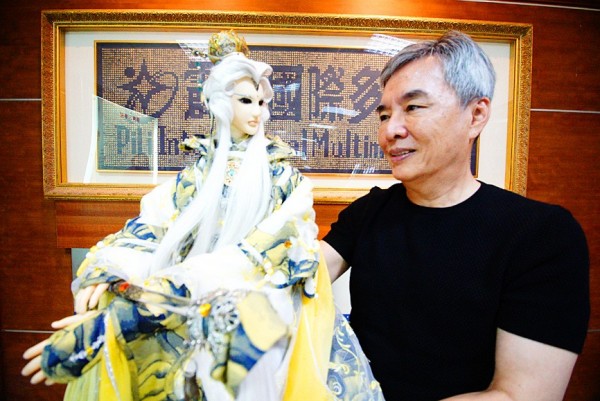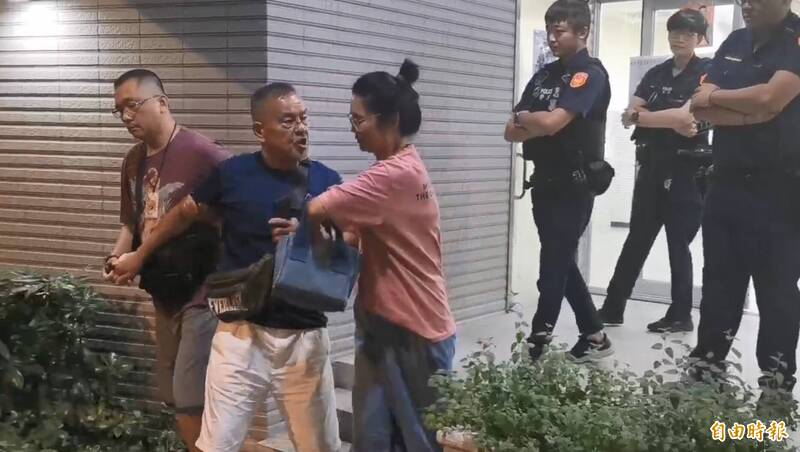《TAIPEI TIMES》INTERVIEW: Grit is the secret to Pili’s success: Huang

Pili Multimedia chairman Vincent Huang holds up a puppet during an interview with the Liberty Times (sister newspaper of the Taipei Times) in Taichung on Sept. 1. Photo: Ho Tsung-han, Taipei Times
Pili Multimedia chairman Vincent Huang in an interview with ‘Liberty Times’ (sister newspaper of the ‘Taipei Times’) staff reporters Lan Tzu-wei and Yang Yuan-ting talked about the history of the long-running martial arts ‘budaixi’ TV show and theater, and shared his vision for the genre’s future
Liberty Times (LT): You once said Su Huan-chen (素還真) — one of the main characters in the well-known Pili ‘budaixi’ (霹靂布袋戲) series — has led Pili for 30 years and the character has never asked for a raise or changed his producer. How was he conceived as a character?
Vincent Huang (黃強華): He was conceived amid much drama. At the time, I had just taken over from my father the script of the show The Scholar Swordsman (雲州大儒俠). The stress was overwhelming; the protagonist, Shih Yen-wen (史艷文), was just too famous. There was no praise for doing a good job, but all the blame for screwing up.
Part of the problem was that Shih is too much of a classical character. I did not want to continue down that path. A protagonist should not be a paragon of the Confucian virtues of beneficence, uprightness, courtesy, temperance and complaisance. I hate putting characters up on a pedestal. They should be multidimensional and driven by human emotions and desires, so I made Su the kind of character that would resort to extraordinary means for the greater good.
Writing characters with depth and layers is what makes them multifaceted, it is what generates dramatic tension that gets people talking about the story.
LT: Shih and Su were the two most popular characters and briefly shared the stage in the 1990s, but Shih was later taken off the show. Why?
Huang: Shih and Su were the show’s twin pillars, but as their poetic introductions alone would make clear, their personalities were vastly different. Su is assertive, while Shih is humble and modest.
Using an allegory, Su is [Foxconn Technology Group chairman] Terry Gou (郭台銘) to Shih’s [Taiwan Semiconductor Manufacturing Co chairman] Morris Chang (張忠謀). The two have different perspectives and have different ways of approaching a situation.
Putting the characters together causes conflict. This shifts the audience’s focus from the plot to the conflict between the protagonists.
Pili has created many heroic protagonists and the audience is attached to them, to the point that fan bases developed around them. Fans argue about their characters online. There have been fans that broke friendships because they liked different characters.
This caused a lot of headaches for our writers. When fans did not find a plot line that dovetailed their expectations, they criticized our writers.
Some creative teams are efficient in using fan-based rivalry to generate interest, but I do not care for it.
LT: Puppet designs were relatively simple in the past. Today, puppets have highly articulated joints that afford a much greater range of motion and mobility. Can you talk about the technical evolution of Pili’s puppets?
Huang: Time is the staircase to progress. It takes a lot of time to perfect technical improvements. Traditional puppetry is restricted by certain factors. The performance emphasizes motion in the absence of camera close-ups. Puppets are incapable of facial expressions. Dialogue and music convey or suggest emotions.
However, facial expressions are key in showing emotions. So some people use silicone-based puppets with faces that can be manipulated. This can be easily done from a technical perspective.
However, I am not ready for it, because by using such methods, budaixi ceases to be puppetry.
When I explore new techniques, I think how the audience defines budaixi and whether deploying those techniques fit with puppetry as a body of tradition.
Frankly, puppets with expressions would most likely boost their market appeal. We at Pili have made feature films and scenes where close-ups were a big problem. It might be that this path is inevitable.
LT: Pili has many fans who are into cosplay. What do you think about the subculture?
Huang: I am impressed by their thoroughness and accuracy of research and presentation. Their passion is what gives meaning to my work.
LT: Pili’s dialogue is a mixture of classical and colloquial Hoklo. What do you think about the controversy over the ratio of classical and colloquial Hoklo in school textbooks?
Huang: We tailor the lines so that the dialogue is not entirely this or that. Sometimes we write proportionally more classical language into the dialogue, but only when it is appropriate for the character. For example, [one of the show’s characters] I Yeh-shu (一頁書) frequently uses classical language.
The usage of classical and colloquial Hoklo is a way to make the characters more well-rounded.
A more important question is what will be used to replace the classical Chinese texts [in school curricula] after its ratio is reduced. Learning languages should be about more than test-taking. It should bring utility to students in their adult lives.
LT: Among Taiwan’s traditional puppet troupes, Pili is the only one to operate a TV channel, be publicly traded and produce two movies. Can you talk about your business model?
Huang: My business model is to have grit, be stubborn and not retreat at the first sign of difficulty.
When we first made forays into the DVD market, one of our partners defaulted on nearly NT$200 million [NT$6.6 million at the current exchange rate] of debt. I stayed optimistic and toughed it out. I want to make puppetry and there is no compromise on that.
In September 2010, we lost hundreds of millions in a fire at our studio. The way I look at it, it was a sign from heaven that I should improve the studio’s equipment. So following that, I built a new virtual studio with dual-camera capabilities and recruited our own computer-generated imagery (CGI) team.
All of the CGI effects in my 3D film The Arti: The Adventure Begins (奇人密碼:古羅布之謎) were made in Taiwan. Although the box office performance was not ideal, we gained valuable experience.
Many people made fun of me, saying: “Why raise cows if all you want is to drink milk?” However, I believe that if we continue with this attitude, we will have to buy milk from abroad forever, so I bought the machines to make [CGI] myself — it does not concern me that I lost some money. At least I have done my part for my nation.
LT: In 2006, Pili tried to make inroads into the US market and last year aired in Japan. There must have been both successes and failures in your international ventures.
Huang: Frankly, Pili’s foray into the US market was a complete flop. The US side of the venture abridged the 30-episode series and gave the iconic character Yeh Hsiao-chai (葉小釵) a hip-hop musical theme.
They all but rewrote the plot. They turned the show into a sheep in wolf’s clothing, but it could not hide the fact that it still crawled like sheep. There was nothing wolfish about it whatsoever.
I told the Americans that with the same budget, we could have easily tailor-made something completely new for the US market. I told them they could have their pick of Romeo and Juliet, Little Red Ridding Hood or whatever else they wanted, because anything was better than that chimerical farce.
The show we coproduced with Japan last year, Thunderbolt Fantasy, is nothing of the sort. Japanese were involved from development to post-production. It caters to the tastes of the Japanese market. Because of that, it was an immediate success.
Translated by staff writer Jonathan Chin
新聞來源:TAIPEI TIMES



















